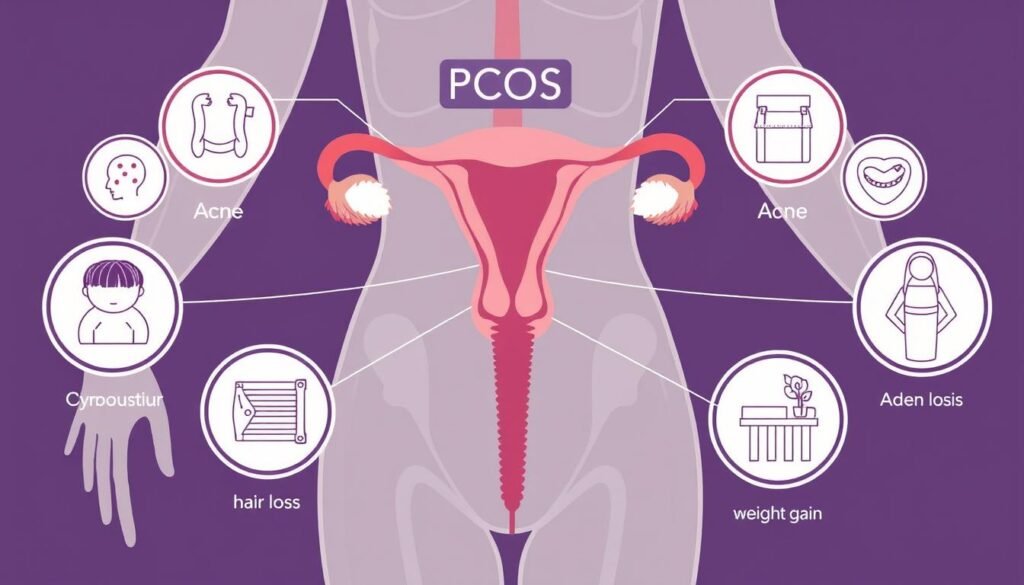Did you know PCOS is linked to over 40% of cases where women can’t conceive? It’s a major concern worldwide, affecting 5-20% of women who are of childbearing age. Besides fertility issues, PCOS increases the risk of obesity, diabetes, and heart diseases. So, looking into the genetic mutations leading to PCOS development is key for better diagnosis and treatment.
Studies show PCOS results from a mix of genes, environment, and lifestyle factors. Even though PCOS runs in families, tracing it is tricky because it does not follow straightforward inheritance patterns. Researchers have found certain PCOS gene mutations that add to the complexity. Reading about the connection between genetics and PCOS’s health effects, like metabolic risks, can be informative. Check out this article for more insights here.
This article dives into the genetics and environmental factors related to PCOS. Understanding both inherited and familial PCOS is essential. We aim to highlight new research that could improve how we diagnose and treat this condition.
Key Takeaways
- Polycystic ovary syndrome (PCOS) affects 15-20% of reproductive age women worldwide.
- More than 40% of female infertility cases are linked to PCOS.
- A diverse array of genetic mutations and variants contributes to the complexity of PCOS.
- Understanding metabolic risks associated with PCOS is crucial for women’s health.
- Research continues to uncover specific genetic markers related to the disease.
Understanding Polycystic Ovary Syndrome (PCOS)
Polycystic Ovary Syndrome (PCOS) is a hormonal disorder affecting 5-15% of women worldwide. It includes symptoms like irregular periods and excessive hair growth. The term polycystic ovary syndrome definition also covers acne and polycystic ovaries seen in ultrasound images.
A detailed PCOS overview shows how this condition affects women’s health. It explores the complex PCOS mechanisms, such as insulin resistance and hormone issues. Insulin resistance increases androgen levels, which may block ovulation and raise infertility risks.
Many women with PCOS face abnormal hormone levels, leading to irregular or ineffective ovulation. This hormonal imbalance often results in many immature ovarian follicles. These follicles can prevent the release of eggs, making conception difficult.
The number of women with PCOS is alarming, and many do not know they have it. Recognizing and treating PCOS symptoms is vital for better health outcomes.
Prevalence and Impact of PCOS
PCOS affects about 6-7% of people worldwide. The World Health Organization says 8-13% of women who can have babies are impacted. Some areas report higher numbers, like South India’s 9.13% among health student women. In the United Arab Emirates, it’s 25.9% based on self-reports. Oman sees a 7% rate in women aged 12 to 45.
About 40% of women with PCOS struggle with infertility. This makes PCOS a top reason for female infertility. The condition also raises the risk of obesity, type 2 diabetes, heart diseases, and endometrial cancer. It shows why knowing about PCOS and acting early is key.
Looking at PCOS rates globally helps understand its causes. A review showed a 3.39% rate in teens using NIH criteria. The MENA region saw a 37.9% rise since 1990. Physical inactivity links to metabolic syndrome traits including PCOS. Still, we need more research on awareness and risks in places like the UAE and Oman.

PCOS can really affect someone’s feelings, causing low self-esteem and depression. Recognizing and dealing with PCOS’s spread and effects is crucial. This helps us find better ways to diagnose and treat it.
Clinical Symptoms and Diagnosis of PCOS
Polycystic Ovary Syndrome (PCOS) is known for a variety of clinical symptoms that impact people significantly. Common PCOS symptoms are irregular periods, too much hair growth (hirsutism), acne, and being overweight. These symptoms can differ a lot between individuals, which makes diagnosing PCOS tricky.
The diagnosis follows certain clinical criteria for PCOS. It looks for at least two out of three issues: irregular ovulation, high levels of male hormones, and signs of polycystic ovaries seen in ultrasounds. This detailed method ensures an accurate PCOS assessment. It helps with planning for management and treatment.
Diagnosing PCOS can be hard because its symptoms are like those of other conditions, such as thyroid issues or high prolactin levels. In-depth evaluations, including hormone tests and imaging studies, are critical to correctly identify PCOS. Interestingly, about 70% of women with PCOS don’t know they have it.

A thorough assessment leads to better ways to manage it and deeper insights into this complicated hormonal disorder. For more info about PCOS symptoms and diagnosis, check out this resource.
Genetics of PCOS: A Multifactorial Approach
The science of PCOS genetics shows it’s a complex condition. It involves genes, environment, and other factors. Polycystic disorders show traits from many genes, which increases the risk of PCOS.
Having a family member with PCOS means you might be more prone to it. PCOS is more common among close relatives. This shows the strong genetic bonds in the disorder. But, scientists have not found a specific gene that can tell if someone has PCOS.
Some genes, like the CYP ones, are key in creating steroid hormones. These genes affect how much androgen someone has. Androgens can cause PCOS symptoms like unwanted hair and acne. To fully understand these connections, we need more research.
Here’s a table showing different genes and how they’re linked to PCOS:
| Genetic Factor | Role in PCOS | Evidence of Impact |
|---|---|---|
| CYP Genes | Influence steroidogenesis | Associated with hyperandrogenism symptoms |
| Insulin Pathway Genes | Affect insulin resistance | Higher risk in obese and lean women |
| AMH Levels | Linked to ovarian function | Elevated levels in daughters of PCOS women |
| Obesity-Related Genes | Contribute to weight gain | Co-occurrence with PCOS in 30% of obese females |
Environment plays a big role in showing genetic traits of PCOS. Things like diet and where you live can affect PCOS symptoms. Studying these factors helps us know more about PCOS’s multifactorial basis.
To learn more about PCOS genetics, read this study on genetic mutations and its effects.
Are There Specific Genetic Mutations That Contribute to the Development of PCOS?
Research into PCOS shows certain genetic mutations might be key. These mutations help us understand this complex condition more.
Studies have shown that genes linked to hormone production and insulin might change in those with PCOS. This discovery is crucial for understanding the disease.
Identifying Genetic Markers in PCOS
Finding specific genetic markers is vital. It helps understand PCOS risks better. Scientists have looked at genes like CYP11A, CYP21, and CYP17, which are important for our body’s hormone balance.
These studies suggest that mutations might mess with hormone levels. This can make someone more likely to get PCOS. By identifying these genetic differences, we might find new ways to treat or prevent PCOS.
The Role of Family History in PCOS Development
If PCOS runs in the family, there’s a higher chance of getting it. Having a mom or sister with PCOS significantly raises your risk.
This shows the importance of family history in assessing PCOS risk. It hints that genetics play a big role in passing down PCOS. Knowing about family history can help with early detection and action.

| Family History Relation | Risk Percentage |
|---|---|
| Mother with PCOS | 25% |
| Sister with PCOS | 33% |
| First-degree relative with diabetes | Increased likelihood |
Key Genetic Factors Associated with PCOS
Recent studies have shed light on key genetic factors of PCOS. They show a complex interaction of gene variants. These variants influence the symptoms and how the condition progresses. Genetics are very important in PCOS. They affect hormonal balance and how the body metabolizes things.
Influence of Gene Variants on PCOS Symptoms
Gene variants can lead to various PCOS symptoms. These include unwanted hair growth, irregular periods, and metabolic issues. Research has found 12 important genes related to PCOS, like RNF144B and IL27RA. The OGN gene plays a central role in hormonal regulation. It does so by affecting the expression of FSHR. More studies are needed to confirm these findings globally.
Studies Linking Gene Mutations to PCOS
Genetic research on PCOS has used data from TCGA-OC and GSE140082. It looks at the link between gene mutations and the syndrome. One major study was referenced 39 times and accessed 11,000 times. This shows its significance in the scientific world. Researchers found 128 genes in common, helping with disease study and future care plans. These studies prove that genetic differences play a key role in PCOS. They pave the way for specialized treatments.
Environmental and Epigenetic Influences on PCOS
Polycystic ovary syndrome (PCOS) isn’t just about genes. Things like lifestyle, what you eat, and certain chemicals play a big part in PCOS. These elements can change how genes work in PCOS without altering the DNA itself.
The impact of too much androgen exposure before birth is crucial to understand PCOS. Babies of PCOS mothers often have more testosterone. This could affect their health later. Such exposure can lead to epigenetic changes through DNA methylation and histone modification. This affects fertility and metabolism genes.
Research shows women with PCOS have different methylation patterns in key genes like LHCGR and PPARGC1A. These genes help with ovarian function and metabolism. Also, overweight PCOS individuals often have more methylation than lean ones. This points to how PCOS and lifestyle, especially weight, are connected at the epigenetic level.
- Environmental factors influencing PCOS:
- Dietary patterns
- Physical activity levels
- Exposure to toxins
- Key epigenetic modifications in PCOS include:
- DNA methylation alterations
- Histone modifications
- MicroRNA expression changes
Knowing how environment and epigenetics intertwine in PCOS helps. It guides us to better lifestyle interventions to manage or prevent PCOS. This gives hope for more effective prevention, especially for those at risk.
Current Research Trends in PCOS Genetics
Understanding the genetics of polycystic ovary syndrome (PCOS) is now more critical than ever. It shapes how treatments are planned and how patients recover. Ongoing PCOS genetic research trends show a big need for better genetic tests for PCOS. This will let doctors create more personalized care plans.
Advancements in Genetic Testing for PCOS
Breakthroughs in advancements in genetic testing for PCOS have changed how we treat the disorder. New tools like next-generation sequencing let scientists look at PCOS genes in detail. This helps find rare mutations that play a role in PCOS, leading to better understanding. Better tests can now spot PCOS patterns early, which is vital.
This disease affects about 8-13% of women of childbearing age and causes up to 40% of infertility issues in women.
Emerging Technologies in Genomic Research
New methods in genomics in PCOS are opening up exciting research paths. Researchers are looking into genes linked to PCOS to see how they affect symptoms and care. Studies together suggest genetics may explain up to 72% of the risk in getting PCOS. This highlights the importance of continuing gene research.
Studies of genes like CYP11A and SHBG hint at new ways to understand testosterone levels in PCOS women. Embracing these findings helps focus on personalized care, improving outcomes for those with the disorder. The future of PCOS genetic research trends looks bright. It brings hope for better understanding and managing PCOS. For more about PCOS symptoms and causes, click here.
Conclusion
Research shows genetic mutations play a big role in PCOS, a common issue. This condition affects 5-10% of women globally, leading to 40% of female infertility. The combination of genetics and the environment makes PCOS complicated. This means both are crucial in diagnosing and treating it.
Looking ahead, PCOS research is on an exciting path. New genetic tests are helping us understand more. For example, finding specific gene changes helps in spotting the syndrome early. The discovery of the CYP11a gene and its link to testosterone is a key step.
Overall, realizing PCOS’s complexity pushes for more study and conversation. We’re on a journey to find better ways to help those affected. This journey is about combining knowledge of genetics with lifestyle factors. It’s aimed at crafting care that’s right for each person.